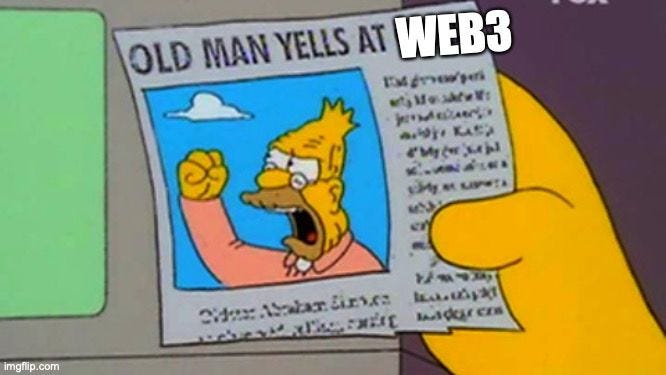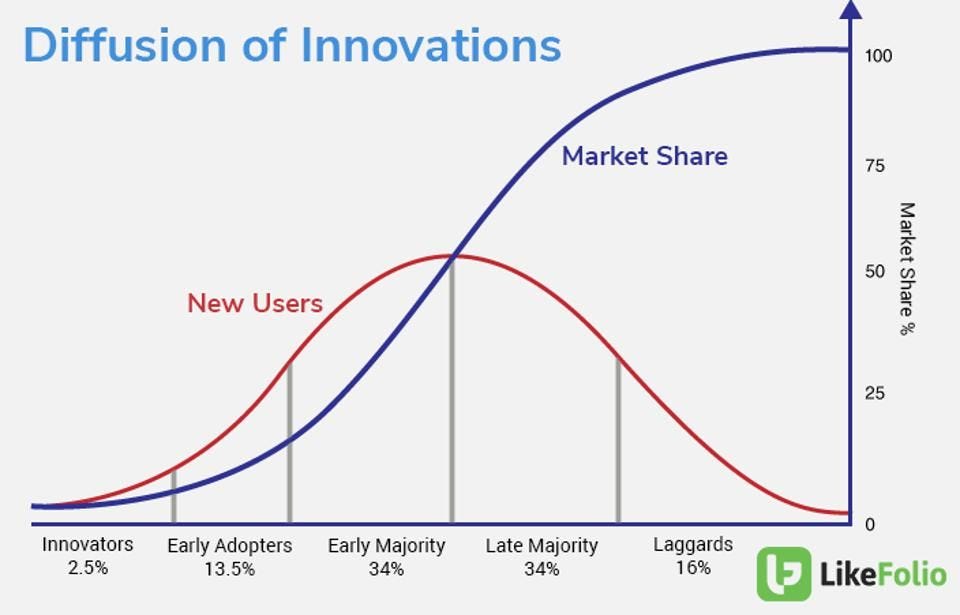I'm a web3 skeptic

It's taken me a while to come to this conclusion, admit it to myself and now admit it to you.
Just because I'm a skeptic, it doesn't mean that I think it's a terrible idea, or that it is not part of the future, or that I won't eventually become enlightened and advocate for its rollout.
It means that for now: I'm skeptical of it.
It's about now that web3 advocates that accidentally clicked this blogs link will sigh and think, "grandpa here doesn't get it", and bounce out.
This statement is correct. I don't get it.
I understand the technology and its moving components, and I know the desire to move ownership and wealth away from a small number of mega-companies and into the hands of the people.
I am less convinced that this is the way to do it. The entire web3 conversation is dominated by a small number of people who push it as the solution to everything. Finance? Web3. Community? Web3. Mysterious rash on the back of your arms? Probably see a doctor (and pay with Eth).
Web3 is a dream come true:
- Be anyone
- No fancy degree
- No family connections
- Live anywhere
- Make major wealth
- Make major impact
All that matters in web3 is that you add (not subtract) from your community— GREG ISENBERG (@gregisenberg) December 18, 2021
I don't mean to pick on Greg specifically and I'm sure his motivations are good; but this is just one a thousand tweets that I've seen over the past few months that try and position web3 as a saviour quoting benefits that we've all enjoyed since the 90s.
These tweets strike me as empty and performative and do little to convice that web3 is more than a marketing term designed to reheat the same concepts as a new product for new buyers.
For me, the most confusing conversations from the newly minted web3 experts are on community.
I build community platforms used by a diverse range of individuals and brands, and I can't even find a foothold in most of these conversations. They seem to position easily solvable points of friction within communities as only fixable by a cooperation or DAO. The concept being that every member has an equal stake in the community however it's not always clear if you have a real stake, or just a vote on whimsy.
Peter Harris does a lot of heavy lifting on this subject:
Its quite possible that many Web3 projects are using the term “cooperative” as an adjective, simply describing their desire to work collaboratively with their membership, rather than in the legal sense as a noun describing an incorporated entity
Why is this bad?
For many reasons, but top of the list is the potential for abuse and/or exploitation in various forms. Having a DAO where members vote on feature upgrades or earn tokens for participation is a long way off from the benefits real co-ops provide, such as being able to submit proposals that change bylaws, vote for new board members to serve the community, or equitably share in profits.
Put another way, I've seen the term "community-owned protocol" when this is actually just a fancy term for being able to vote for features in their app, but has no meaningful impact on decision making on the corporate level, including who actually owns the service — the founders and investors.
I suspect a lot of anxiety over web3 community ownership comes from NFT communities where it is vital the community remains well run and healthy to keep the money flowing.
I respect the true pioneers. Without Tim Berners-Lee, you wouldn't be reading this. Without Steve Jobs, personal computers would still be beige and have a DVD-ROM drive. Without the early web pioneers figuring out how to add images to HTML, the web wouldn't have flourished. Those genuinely working hard on web3 technology because they believe they are building a better world that benefits regular people? I am all for that.
After all… as humans we should aspire to be accountable to our fellow humans. Hyper-individualism has been a scourge for humanity, but with the ongoing evolution of these new collective organizational forms, there is hope.
Peter Harris
The need for, and fear of regulation
Just like all the previous iterations of the web, web3 is a largely unregulated playground. The adoption curve of new technology is well known:
Technologies tend to be adopted over time in a similar pattern. This is called the adoption curve (red line above).
The first users to try something are represented by a small slice of the population called Innovators, ready to try the next new thing at the drop of the hat.
As time moves on, if the technology is successful, more and more people adopt it.
Early Adopters are a small but critical group to the success of a technology’s spread. If a technology can succeed with that section of the population, it will hit a tipping point.
I think at this point it's worth separating the technology from the humans. Here, I want to focus on the latter as most of my critcisms are not aimed at distributed systems and blockchain.
The Wild West was so named for the lawlessness of the untamed territories west of the Mississippi River during its frontier period. It was an exciting period of time for discovery and staking claim to new lands but life expectancy was brutally short and you were constantly being robbed. Without law and order, villains prosper just as easily as Nazis dominate any community platform that has little moderation.
NFTs are a great way for creators to get paid well for their skill. However, without a regulatory body to fall back on, crime is rife.
Sadly I'm going to have to completely shut down my entire @DeviantArt gallery as people keep stealing my art and making NFTs. I can't - and shouldn't have to - report each one and make a case, which is consistently ignored. Sad and frustrating. pic.twitter.com/oNH6yXQtyU
— Liam 'Sharpy' Sharp (@LiamRSharp) December 17, 2021
I will accept that it is unfair to cherry pick data and present it as representative of all things in web3 however it is undeniable that the villains have found fertile ground for profiteering. In 2016, Ethereum was forked when a bad actor exploited a flaw in the smart contract software and stole $50m in ethereum. The fork effectively rolled back the theft forcing Ethereum into two versions and not without a lot of grinding of teeth within the community. Molly White maintains a log of all grifting activity and it's worth a scroll.
Without regulation, web3 is a dangerous place to put your hard earned cash. You may make it, or you may have the lot stolen or devalued by the "pump and dump" hype machine. However, with regulation, all the perceived benefits of web3 will be lost anyway.
Sadly, humans are imperfect and capable of dark deeds driven by greed. Once the adoption phase moves past the early innovators who genuinely want to build a better place into a majority adoption phase, the bad actors will increase in number. As a developer in "web2" the majority of code is to deflect potential attacks and at Invision Community we have sophisticated WAFs to keep our platform online. I sense a similar fate for all future iterations of the web because people are people.
I'm skeptical but I am not unwilling to learn and adapt. I'm also quite excited by the possibility of change. I hope there is a better model for content ownership and ways to reward its creators directly.
Who are the genuine web3 builders and architects? Let me know on Twitter.



